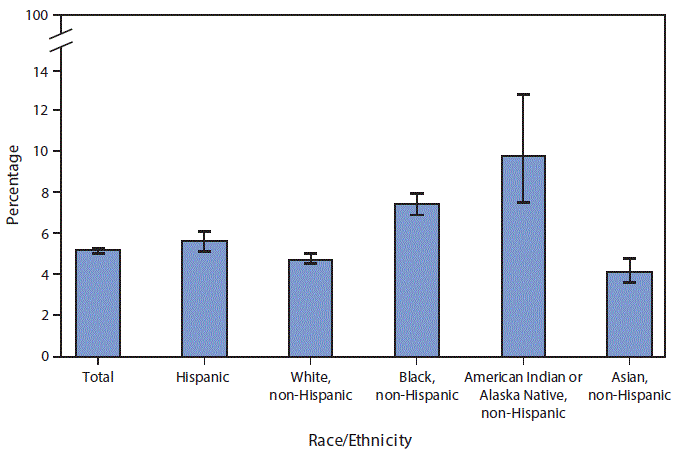QuickStats: Age-Adjusted Percentage* of Adults Aged ≥45 Years Who Were Limited in Any Way Because of Difficulty Remembering or Periods of Confusion,† by Race/Ethnicity§ — United States, 2014–2016¶
Weekly / November 3, 2017 / 66(43);1205

* With 95% confidence intervals shown with error bars. Estimates are age-adjusted to the projected 2000 U.S. population as the standard population using three age groups: 45–49, 50–64, and ≥65 years.
† Based on a positive response to the survey question, “Are you/Is anyone in the family limited in any way because of difficulty remembering or because you/they experience periods of confusion?” Responses may be self-reported or reported by a knowledgeable family member. Information is obtained on each family member with the condition/limitation and included in the estimate of total prevalence.
§ Categories shown are for Hispanic adults, who may be of any race or combination of races, and non-Hispanic adults who selected one racial group. Not all race groups are shown. Total bar is based on all adults aged ≥45 years.
¶ Estimates are based on household interviews of a sample of the civilian, noninstitutionalized U.S. population and are derived from the National Health Interview Survey Family Component.
Overall, 5.1% of adults aged ≥45 years were limited in any way because of difficulty remembering or periods of confusion. The percentage of adults experiencing this limitation was highest among non-Hispanic American Indian/Alaska Native adults (9.8%) and non-Hispanic black adults (7.4%), followed by Hispanic adults (5.6%), non-Hispanic white adults (4.7%), and non-Hispanic Asian adults (4.1%).
Source: National Health Interview Survey, 2014–2016 data. https://www.cdc.gov/nchs/nhis.htm.
Reported by: Charlotte A. Schoenborn, MPH, cas6@cdc.gov, 301-458-4485; Maria A. Villarroel, PhD; Tina Norris, PhD; Tainya C. Clarke, PhD.






















.jpg)












No hay comentarios:
Publicar un comentario